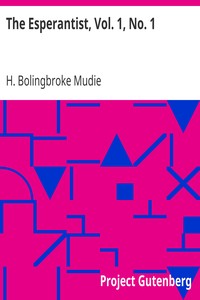The Esperantist, Vol. 1, No. 1 by H. Bolingbroke Mudie
"The Esperantist, Vol. 1, No. 1" by H. Bolingbroke Mudie is a periodical dedicated to the promotion of Esperanto, the international language, and was published during the early 20th century. This publication aims to spread knowledge about Esperanto and cultivate a community among English speakers who are interested in learning and using the language. The contents include articles, translations, and discussions about the advantages and practices of adopting Esperanto as a means
of international communication. In this inaugural issue, the publication opens with an article expressing hope for Esperanto as a key language to foster global communication. The editor's page emphasizes the aim to unite English-speaking Esperantists and outlines methods to recruit new learners. Various contributions provide insights into how Esperanto can be practically applied in daily life, highlight humorous interpretations of telegraphy, and explore its grammatical structure. The issue serves both as an introduction to the language and as a call to action for readers to engage with the Esperantist movement, thereby reflecting the optimism and collaborative spirit surrounding the Esperanto community at the time. (This is an automatically generated summary.)
Read or download for free
| How to read | Url | Size | |||
|---|---|---|---|---|---|
| Read now! | https://www.gutenberg.org/ebooks/28720.html.images | 109 kB | |||
| EPUB3 (E-readers incl. Send-to-Kindle) | https://www.gutenberg.org/ebooks/28720.epub3.images | 282 kB | |||
| EPUB (older E-readers) | https://www.gutenberg.org/ebooks/28720.epub.images | 281 kB | |||
| EPUB (no images, older E-readers) | https://www.gutenberg.org/ebooks/28720.epub.noimages | 100 kB | |||
| Kindle | https://www.gutenberg.org/ebooks/28720.kf8.images | 681 kB | |||
| older Kindles | https://www.gutenberg.org/ebooks/28720.kindle.images | 671 kB | |||
| Plain Text UTF-8 | https://www.gutenberg.org/ebooks/28720.txt.utf-8 | 87 kB | |||
| Download HTML (zip) | https://www.gutenberg.org/cache/epub/28720/pg28720-h.zip | 320 kB | |||
| There may be more files related to this item. | |||||
About this eBook
| Editor | Mudie, H. Bolingbroke (Harold Bolingbroke), 1880-1916 |
|---|---|
| Title | The Esperantist, Vol. 1, No. 1 |
| Note | Reading ease score: 57.3 (10th to 12th grade). Somewhat difficult to read. |
| Credits |
Produced by David Starner, Andrew Sly and the Online Distributed Proofreading Team at https://www.pgdp.net (This book was produced from scanned images of public domain material from the Google Print project.) |
| Language | English |
| Language | Esperanto |
| LoC Class | PM: Language and Literatures: Indigenous American and Artificial Languages |
| Subject | Esperanto -- Periodicals |
| Category | Text |
| EBook-No. | 28720 |
| Release Date | May 8, 2009 |
| Most Recently Updated | Jan 5, 2021 |
| Copyright Status | Public domain in the USA. |
| Downloads | 89 downloads in the last 30 days. |
| Project Gutenberg eBooks are always free! | |

